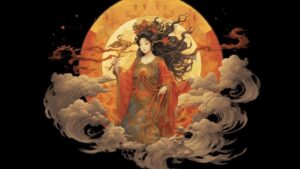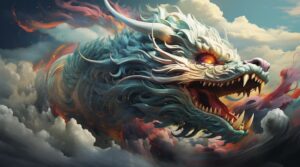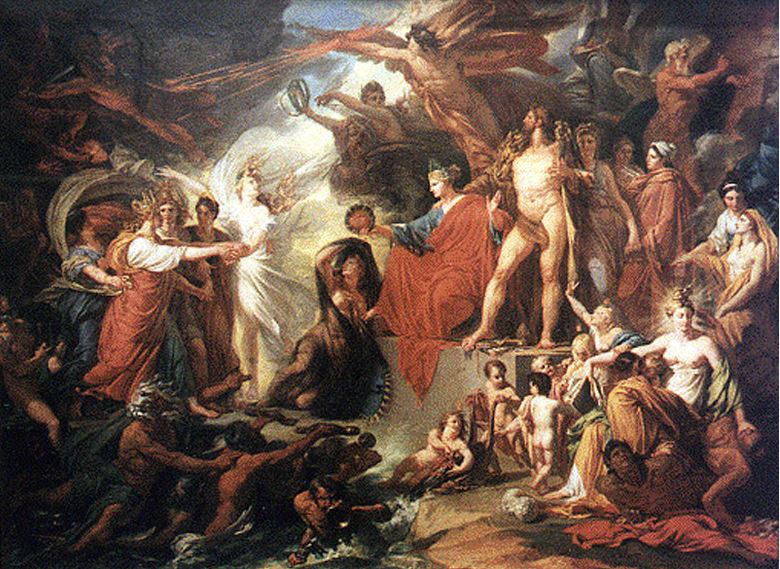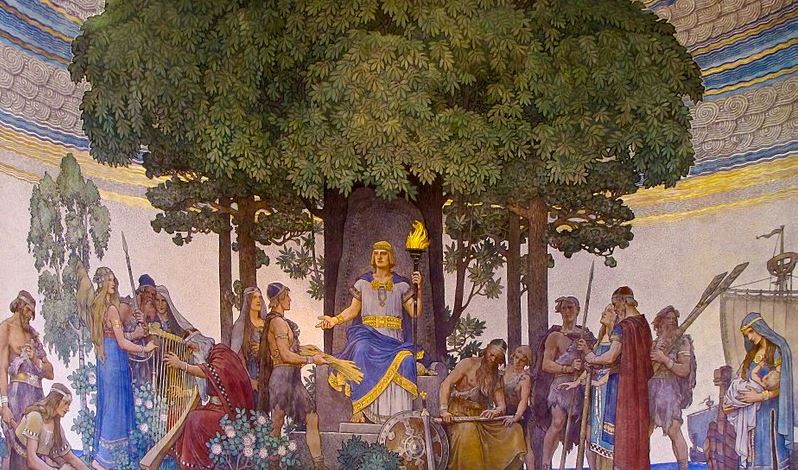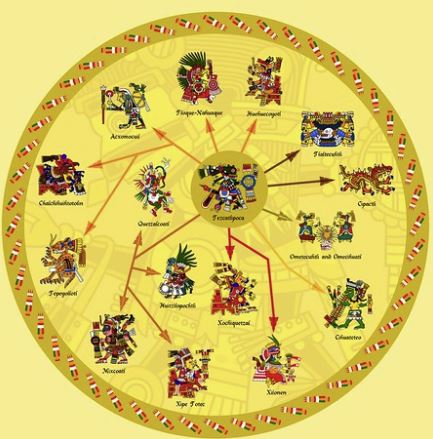Welcome to Old World Gods, Your Reference Site for All the Gods and Goddesses of the Ancient Cultures
Religion has always being a crucial matter for the people and the cultures around the world since the beginning of human life.
Even when, nowadays, monotheism is currently the major belief, the ancient cultures on Earth were mostly polytheist and they worshipped different gods and goddesses that would grant them their favors, free them of plagues and disasters, and protected them against diseases.
Here are some of the most important polytheism gods and goddesses of some ancient cultures
What is polytheism?
Polytheism is the belief in the existence of multiple deities which are gathered into a single pantheon of gods and goddesses.
In the different religions that assume polytheism, the gods and goddesses of the pantheon are representations of the force of nature or entities related to the sky and celestial bodies that are typically autonomous.
In some other polytheist religions, many of the main gods and goddesses come from one main entity that gives birth to the rest of the deities.
According to History, polytheism was the first religion registered in the world, and it was predominant until the Axial Age of Humanity.
What is the difference between monotheism and polytheism?
The difference between monotheism and polytheism is that the first type of religion assumes that there is only one main God, while the latter assumes multiple gods and goddesses, each one of them assigned to a different nature force.
As a matter of fact, the polytheist does not always worship all of their gods and goddesses equally, as they can feel more veneration for ones than for others.
This fact can change depending on the content and depending on the region of the culture because some polytheists might worship a selection of gods and goddesses above others.
That was actually the case in some parts of the ancient Egyptians, as they had different preferences for some gods and goddesses along with the different eras.
Polytheism in a sentence
As the author Yuval Noha Harari stated, the differences between monotheism and polytheism can be stated like this:
Sapiens (from animals to gods) (2014), Yuval Harari.
Polytheism Religion Examples
Some of the most important polytheist religions are the Egyptian, the Greek, the Roman, the Celtic, the Norse, the Mayan, or the Japanese.
However, even when some people consider that polytheism is something of the past, we must not forget that nowadays, there are several polytheist religions in the world, such as the Traditional Chinese religion, Hinduism, or the Japanese Shintoism.
Let us take a look at the most important religions in the world!
Egyptian Religion and the Egyptians gods and goddesses
The Egyptian Religion is thousand years old, and the influence of the Egyptian gods and goddesses come from the year 3300 B.C. to the year 535 A.C where the worship and rituals to them were prohibited.
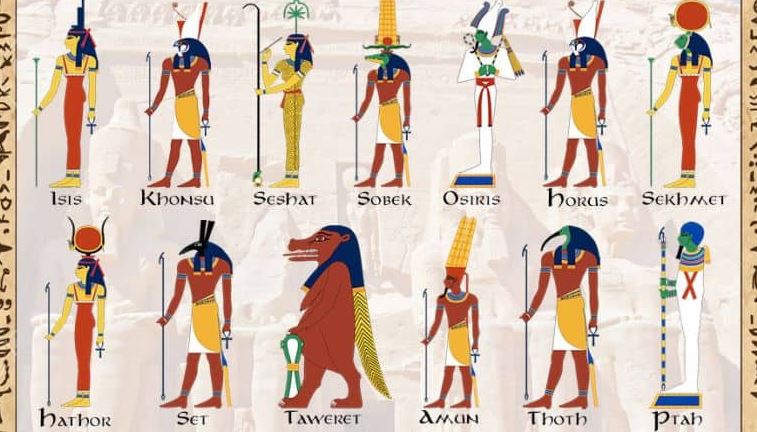
The Egyptian gods and godesses
There are plenty of myths in the Egyptian writings and arts in which the story of the Egyptian gods and goddesses was told.
The Egyptians considered the time in the present moment as a series of cyclical patterns, while the earliest moments of humanity were considered linear.
That is the reason why the myths of the creation of the world by the primordial gods are told as a one-time event, while some other myths such as the daily journey of Ra through the world are a cyclical pattern.
The majority of the Egyptian myths are metaphorical and they try to translate the behavior and the essence of what the Egyptian gods and goddesses did for humans could understand.
Even when the number of Egyptian gods and goddesses surpassed 200, we have gathered a list of the most important deities so you can learn more about them.
List of Egyptian Gods and Goddesses
Roman Religion and the Roman gods and goddesses
Even when the Roman religion takes its root in the Italic people and the Proto-Indo-European mythology, it was highly influenced by the Greek mythology as a huge part of their art, and artistic are quite similar to them.
Although the Greeks vastly influenced them, the Roman gods and goddesses are quite different in some aspects, characteristics, and in myths and stories even when the common conception believes otherwise.
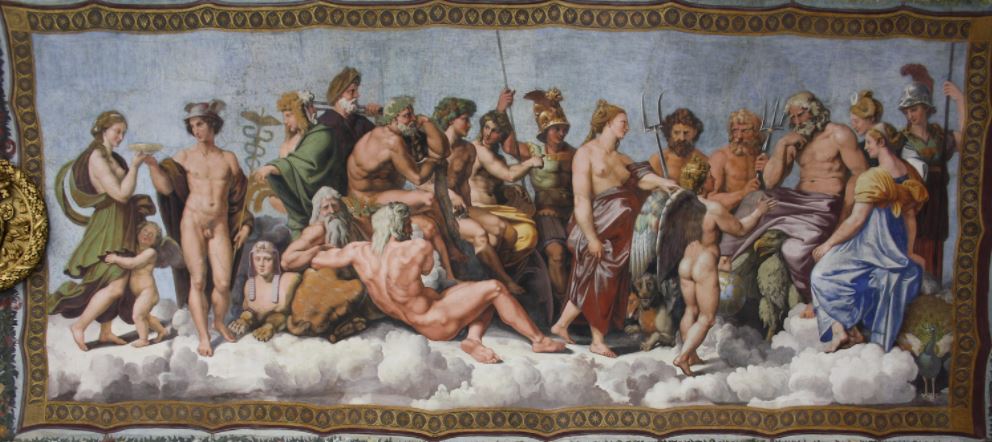
In some cases, some of the Roman gods and goddesses shared many aspects with the Greek gods and goddesses. The best example of this is the leader of the Roman Pantheon, Jupiter the King of the Gods, whose Greek counterpart is Zeus.
In other cases, they simply shared the same god as is was the case with the god Apollo, who was the god of the Sun and the Music in both mythologies.
Even when the number of the Roman gods and goddesses was not as high as the Egyptian gods and goddesses they easily surpassed the 100 deities. Here we have gathered a list of the most important deities so you can learn more about them.
List of Roman Gods and Goddesses
Norse Religion and Norse gods and goddesses
The Norse religion is known by many different names such as Norse Paganism, Germanic Mythology, or the Scandinavian Mythology, and it is dated from the Middle Age of Humanity.
The Norse mythology is plagued by tales of various deities, heroes, and other beings known as dwarfs, jottuns, and elves that lived in the Nine Worlds around the World Tree Yggdrasill.
In this religion, the Norse gods and goddesses interact between them and with the humans and the other beings.
Unfortunately, a vast part of the knowledge about this religion has been lost because it was transmitted orally, instead of written.
However, there are a few manuscripts that contain many of the stories of the Norse gods and goddesses, as well as legends around the creation of the world and its destruction.
The Norse gods and goddesses
For example, in Norse mythology, it was considered that the world was created from the flesh of the primordial being Ymir, the giant frost, and the first two humans, Ask and Embla.
As we have stated before, Norse mythology lacks many sources because it was mostly transmitted from mouth to mouth.
Even though, there were about 50 Norse gods and goddesses known. Here, we have gathered a list of the most important deities so you can learn more about them.
List of Norse gods and goddesses
Aztec Religion and Aztec Gods and Goddesses
The Aztec religion originated from the people living in central Mexico through the years 1300 and 1521 approximately.
As with the previous religions, the Aztecs were polytheist and they included many gods and goddesses for the many different matters in their lives. Even in some circumstances, the Aztecs borrowed some deities from other geographic regions and people into their own pantheon.
The Aztec mythology, through their creation myth, believed that in order to preserve the cycles of life on Earth, they needed to perform blood sacrifices just like their gods and goddesses did to continue the natural order of things.
Through these sacrifices, they also pleased their gods and goddesses.
A diagram of the Aztec Gods and Goddesses
Even when nowadays, we could think of the Aztec society as brutal and bloody, by understanding the context and their beliefs, these sacrifices made sense, as they truly believed that they were responsible for continuing the cycle of life.
Unfortunately, many of the Aztec mythology facts and beliefs have been lost in time due to the colonization by the Europeans.
However, there are records that there were more than 100 Aztec gods and goddesses in their pantheon. Here we have gathered a list of the most important deities.
List of Aztec gods and goddesses
Japanese Religion and Japanese Gods and Goddesses
The world of Japanese mythology is a world of gods, goddesses, and supernatural beings. These divine spirits have played an important role in shaping Japanese culture and traditions. From Amaterasu, the goddess of the sun and ancestor of the Imperial Family, to the Seven Lucky Gods, Japanese gods and goddesses are greatly revered in Japan.
Lesser-known deities like Ebisu, the god of luck and fortune, and Inari, the deity of fertility, also hold significant importance in Japanese culture. These gods and goddesses have been depicted in art, celebrated in festivals, and venerated at temples and shrines throughout Japan.
List of Japanese Gods and Goddesses
Mayan Religion and Mayan Gods and Goddesses
The Aztec religion was a particularly interesting religion that was developed in the central parts of Mexico approximately through the years 1300 and 1521.
The Aztecs had a strong connection to their deities and they performed multiple human sacrifices in order to keep them satisfied and for them to grant them their favor.
The number of ancient Aztec gods and goddesses is quite large, it easily reaches more than 100 deities, but of course, just like in many other pantheons, the vast majority of the deities are minor gods that do not have too much relevance.
List of Mayan Gods and Goddesses
Slavic Religion and Slavic Gods and Goddesses
Slavic gods and goddesses have long been revered in the rich mythology and religious traditions of Eastern Europe. From Perun, the mighty god of thunder and sky, to Lada, the goddess of love and beauty, these deities hold a significant place in Slavic culture.
Throughout history, beliefs, rituals, and worship of these ancient gods have shaped the lives and art of the Slavic people. In this article, we will delve into the origins, pantheon, and influence of Slavic mythology, exploring its connections to other pantheons and the contemporary revival of Slavic religion.
List of Slavic Gods and Goddesses
Korean Religion and Korean Gods and Goddesses
Korean mythology is a captivating world filled with a diverse range of gods and goddesses. These mythical beings play significant roles in Korean culture and history. Some prominent deities include Sang-Je, the supreme god, Yeomna, ruler of the underworld, Seokga, the cunning trickster god, and Dalnim, the enchanting moon goddess.
Other noteworthy figures are Jacheongbi, the goddess of agriculture, Mireuk, the deity of creation and destruction, Paritegi, the guide for spirits, and Hwanung, a divine being sent to govern mortals.
Explore the realms and influences within Korean mythology, which draw from shamanistic, Buddhist, and Taoist beliefs.
List of Korean Gods and Goddesses
Chinese Religion and Chinese Gods and Goddesses
Chinese mythology is a fascinating realm filled with gods and goddesses, each possessing unique roles and characteristics. From the mighty Jade Emperor, ruler of heaven and earth, to the compassionate goddess Guanyin and the mischievous Sun Wukong, these divine beings hold significant cultural significance in Chinese folklore.
Legends like the creation myth of Pangu and the epic journey of Sun Wukong captivate audiences with their timeless tales. Join us as we explore the rich tapestry of Chinese mythology and its enduring legacy in modern times.
List of Chinese Gods and Goddesses
Sumerian Religion and Sumerian Gods and Goddesses
The Sumerian pantheon, consisting of gods and goddesses, played a significant role in the ancient civilization of Mesopotamia. These deities held various roles and characteristics, shaping the Sumerian cosmology and creation mythology.
One prominent figure is Enki, the god associated with water, wisdom, and magic, who played a crucial part in human creation and agricultural prosperity. Other notable deities include Enlil, the powerful god of wind and storms, and Inanna, the dualistic goddess of love, beauty, and war.
Explore the intriguing world of Sumerian gods and goddesses and their unique powers and relationships in ancient Mesopotamia.
List of Sumerian Gods and Goddesses
Canaanite Religion and Canaanite Gods and Goddesses
The origins of Canaanite gods and goddesses can be traced back to the ancient Canaanite civilization, which flourished in the region now known as Israel and Palestine during the Bronze Age.
These deities were a central part of Canaanite religious beliefs and played a crucial role in their society.
Canaanite mythology depicted gods and goddesses as powerful beings who controlled various aspects of life. They were personifications of natural forces, celestial bodies, and abstract concepts. The origins of these deities can be found in the local cultures and traditions of the ancient Near East, as well as influences from neighboring civilizations such as Egypt and Mesopotamia.
List of Canaanite Gods and Goddesses
Irish Religion and Irish Gods and Goddesses
Celtic mythology is a fascinating world filled with a diverse array of Irish gods and goddesses. The Tuatha Dé Danann, including powerful figures like Morrigan, Brigid, and Lugh, play integral roles in Irish folklore.
Danu, known as the mother goddess, holds significance among the Irish deities. Additionally, Cernunnos, the horned god, emerges in Celtic mythology. Tales and stories of these deities captivate the imagination, while their influence remains deeply rooted in Irish culture.
Explore the rich and enchanting realm of Irish gods and goddesses and their lasting impact on Ireland.
List of Irish Gods and Goddesses
Welsh Religion and Welsh Gods and Goddesses
Welsh gods and goddesses have a rich mythological heritage rooted in Celtic influences. This pantheon comprises divine figures like Rhiannon, Arianrhod, and Branwen among the great goddesses, and powerful gods such as Bran the Blessed, Lleu Llaw Gyffes, and Mabon ap Modron.
Their captivating tales, including the War of the Welsh and Irish and the Battle of Matholwch, continue to intrigue us. As we explore their stories and traditions, we find connections to harvest celebrations like Mabon and discover their lasting impact in contemporary literature and rituals.
List of Welsh Gods and Goddesses
Persian Religion and Persian Gods and Goddesses
Welcome to the captivating world of Persian gods and goddesses, where ancient mythologies unfold. In this section, we delve into the mystical realm of Iranian religion, exploring the divine entities revered by the ancient Iranians.
The pantheon of Persian gods and goddesses reflects the rich tapestry of beliefs and spiritual practices of ancient Iran. From the revered Ahura Mazda, the supreme god associated with wisdom and creation, to Mithra, the radiant Sun god symbolizing loyalty and justice, each deity has a unique role and significance in the intricate fabric of Persian mythology.
List of Persian Gods and Goddesses
Celtic Religion and Celtic Gods and Goddesses
The Mythology of the Tuatha Dé Danann reveals a captivating world of Celtic gods and goddesses. From the powerful Morrigan, the deity of war, to Brigid, the triple goddess of fire, healing, and poetry, each figure holds a unique role in Celtic mythology.
Discover Lugh, the multiskilled god, and Dagda, the wise god of fertility and wisdom. Explore Rhiannon, the goddess of fertility and communication, as well as Cernunnos, the horned god associated with the wild.
List of Persian Gods and Goddesses
Mesopotamian Religion and Mesopotamian Gods and Goddesses
Mesopotamian mythology is a rich tapestry of gods and goddesses that held great importance in the ancient civilizations of Sumer, Babylon, and Assyria. With roots in the cradle of civilization, these deities shaped the beliefs and practices of the Mesopotamian people.
From the moon god Nanna/Sin to the powerful rulers Enlil and Enki, each deity had a unique role and significance. Through ancient texts and rituals, we gain insight into their worship and the influence they had on the broader region.
Delve into the captivating world of Mesopotamian mythology as we explore its gods and goddesses.
List of Mesopotamian Gods and Goddesses
Inca Religion and Inca Gods and Goddesses
The Inca gods and goddesses played a crucial role in Inca religion and culture. They included deities like Inti, the sun god, and Mama Quilla, the goddess of the moon and femininity.
Viracocha was the god of creation and the sea, while Pachamama personified the earth and nature. The Inca society revered these gods through elaborate rituals, prayers, and offerings.
Machu Picchu held a special place as the most sacred site for the Incas.
In Inca mythology, a belief in three planes, Hanan Pacha, Kay Pacha, and Uku Pacha, existed. These gods had human-like emotions but required proper behavior and respect. Ancestral worship, agricultural importance, and a deep connection to nature characterized Inca religious practices.
List of Inca Gods and Goddesses
Navajo Religion and Navajo Gods and Goddesses
The Navajo gods and goddesses hold significant roles in Navajo mythology. They encompass a diverse pantheon with deities like Estsanatlehi, Tonenili, Hastsehogan, Yolkaiestsan, Tsohanoai, Nohoilpi, Tklehanoai, and Hastseoltoi. These powerful beings possess unique powers and responsibilities.
While detailed stories and myths are not provided, online resources offer lists and databases with information on these gods and their alternate names. Delve into the enchanting world of Navajo mythology, exploring their tales, rituals, and cultural significance.
Let us embark on a journey to discover the fascinating Navajo gods and goddesses.
List of Navajo Gods and Goddesses
Yoruba Religion and Yoruba Gods and Goddesses
In Yoruba mythology, a rich tapestry of gods and goddesses exists, each playing significant roles within the community. The pantheon includes major deities like Olorun, the supreme creator responsible for all in the world, and Obatalá, the god of fertility.
Other notable deities mentioned are Oshun, the goddess of love and beauty, and Shango, the god of thunder. These gods and goddesses are considered divinized ancestors, and every Yoruba is believed to descend from one of them.
List of Yoruba Gods and Goddesses
Greek Religion and Greek Gods and Goddesses
Greek mythology gods and goddesses are a captivating part of ancient lore. These mythical deities, such as Zeus, Hera, Poseidon, and Athena, ruled over different aspects of human life from their abode on Mount Olympus.
The Greek pantheon also included heroes like Heracles and Perseus, as well as fearsome monsters like Medusa and the Minotaur. Greek mythology’s rich tapestry has influenced art, literature, and culture throughout history, leaving a lasting impact on society.
List of Greek Gods and Goddesses
Indian Religion and Indian Gods and Goddesses
Indian gods and goddesses play a significant role in Hinduism, a diverse and ancient religion. With numerous deities such as Brahma, Vishnu, Shiva, Saraswati, Lakshmi, Parvati, Ganesha, Krishna, Hanuman, Indra, and Kali, Hinduism embraces a vast pantheon.
List of Indian Gods and Goddesses
Etruscan Religion and Etruscan Gods and Goddesses
The mythology of Etruscan gods and goddesses holds a significant place in the ancient traditions of Italy. With strong influences from Greek mythology and later incorporation into Roman culture, these deities shaped the religious beliefs of the Etruscan civilization.
List of Etruscan Gods and Goddesses
Filipino Religion and Filipino Gods and Goddesses
Filipino gods and goddesses play a significant role in the rich mythology of the Philippines. They are deeply rooted in the beliefs and traditions of the ancient Tagalogs, with Bathala being the supreme god.
Other major deities include Apolaki, the god of war and the sun, Mayari, the goddess of the moon and night, and Tala, the guiding deity of the stars.
Lesser deities like Diyan Masalanta, Anitun Tauo, and Magwayen also hold their own importance.
These divine beings have influenced Philippine arts, literature, and music, and continue to shape modern Filipino culture, preserving its heritage and captivating with their timeless stories and legends.
List of Filipino Gods and Goddesses
Finnish Religion and Finnish Gods and Goddesses
Finnish gods and goddesses hold a significant place in Finnish mythology, deeply rooted in the country’s cultural heritage. The rich tradition of Finnish folklore has preserved these ancient beliefs throughout the centuries.
Explore the prominent figures like Väinämöinen, a wise and magical hero, Ukko, the mighty god of thunder and sky, and Tapio and Mielikki, the guardians of the forest and nature.
List of Finnish Gods and Goddesses
Cherokee Religion and Cherokee Gods and Goddesses
Cherokee gods and goddesses play a significant role in their spiritual beliefs. According to Cherokee mythology, these divine beings were instrumental in the creation of the world and continue to influence their culture.
The wise and powerful Sun Goddess, Unelanuhi, holds a prominent position, along with other enigmatic figures such as the traveler spirits, the stone man, the trickster rabbit, the thunder god, and the mysterious witch.
Cherokee mythology also encompasses rituals, ceremonies, healing practices, and the preservation of their oral traditions. Various written resources and online sources provide insights into this captivating aspect of Cherokee culture.
List of Cherokee Gods and Goddesses
Hawaiian Religion and Hawaiian Gods and Goddesses
Hawaiian gods and goddesses play a significant role in the rich mythological heritage of Hawaii. From Kane, the god of creation and sky, to Kanaloa, the powerful god of the ocean and underworld, each deity represents different aspects of nature and life.
Lono, the god of fertility and agriculture, and Ku, the god of war and protection, are also revered. Other notable deities include Pele, the fiery goddess of volcanoes, Laka, the divine patroness of hula dance, Maui, the heroic demigod, and Haumea, the goddess of fertility.
These mythological figures hold deep cultural significance and have spurred the preservation and exploration of Hawaiian mythology in modern society.

